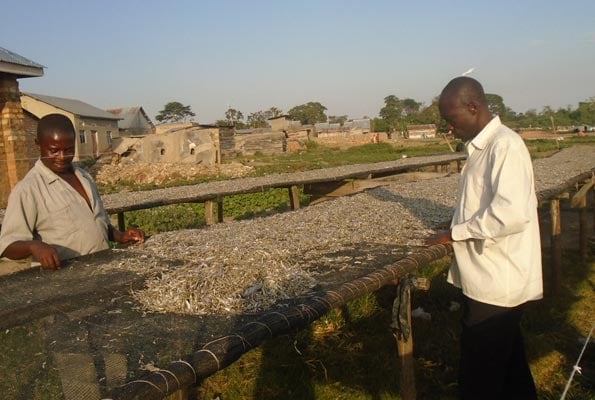Prime
Govt drafts policy on catching mukene

Fishermen at Ssenyondo landing site in Mpigi District sort silverfish on drying racks. PHOTO/ FILE
What you need to know:
- The Small Pelagic Species fishery has existed for over 50 years since introduction on Lake Victoria in the 1970s from Lake Tanganyika
The Ministry of Agriculture, Animal Industry and Fisheries has drafted a new policy to guide on catching of small fish species on lakes.
The policy developed by National Fisheries Resources Research Institute (NaFRRI), a government body responsible for research in all water bodies across the country, guides the management of fisheries and the sector efectively.
Small pelagic or open lake fish species comprise small-bodied fish species, measuring 10 centimetres or 100 millimetres in length.
In Uganda, such fishes include mukene from lakes Victoria, Kyoga, and Nabugabo; and muziri, and ragoogi from Lake Albert. The small fish species contribute between 60 and 70 percent of the total fish catch on Uganda’s big lakes of Victoria, Albert and Kyoga.
Mr Herbert Nakiyende, a researcher with NaFRRI, said policy would address the appropriate harvesting technologies for the pelagic species.
“This policy will guide the fishing of small fish which are dominating but with conflicts associated with them and people who target the large fish, especially the Nile Perch,” Mr Nakiyende said.
He added: “The policy will guide on how many nets, what type of light, and size of net to be used.”
Mr Nakiyende said regulation is crucial for ensuring sustainable harvesting of small fish while promoting coexistence among fishers targeting larger species.
NaFRRI says these small fish contribute to the national economy and employ more than 60 percent of the fishing community, account for about 70 percent of the total lake biomass, and support the animal feed industry.
Mr Nakiyende said: “On Lake Victoria, we catch between 300 to 400 tonnes of mukene annually, while on Lake Albert we catch around 200,000 tonnes of ragoogi.”
He said the policy also addresses post-harvest loss since the species are harvested in bulk and are wasted due to inadequate facilities for processing. The policy proposes ideas on how the lakes will be given rest to ensure they promote stock recruitment.
Mr Nakiyende said: “We are proposing a resting period where the mukene fishers can operate for not more than 20 days to correspond to the darker period of the moon then they rest for 10 days so that in that period they are resting, we can minimise the conflicts but also give rest to the fish stock so that they can respond and reproduce.”
Initially, the use of solar lights on lakes was banned due to concerns about facilitating the capture of immature fish. However, research conducted by NaFRRI and the Uganda National Renewable Energy and Energy Efficiency Alliance (UNREEEA) demonstrated that solar lamps are a safer and more environmentally friendly alternative to kerosene lamps and other fuel-powered gear for night fishing.
Mr Benard Mbaine, the CEO of UNREEEA, said: “Solar lights are very clean and have no effect and no issues of excessive light because light intensity doesn’t cause variation in the catch.”
Ms Hellen Adoa, the State Minister for Fisheries, urged government to look into the prices of solar lights to enable the fishermen access them widely.




